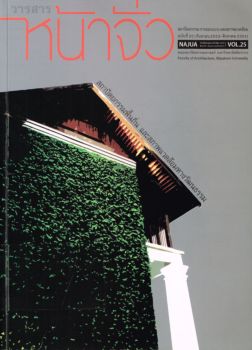ศรัทธาวิวัฒน์ในกลุ่มชาติพันธุ์ุลาวโซ่ง
Keywords:
ความศรัทธา, นิเวศวิทยาวัฒนธรรมชาติพันธุ์, วิวัฒนาการ, การปรับตัว, ลาวโซ่ง, Faithfulness, Cultural Ethnoecology, Evolution, Adjustment, Lao SongAbstract
“ศรัทธา” คือความรู้สึกที่เกิดจากกระบวนการทางจิตใจของมนุษย์ ซึ่งถูกพัฒนามาจากความเชื่อในเหตุผลของตนเป็นที่ตั้ง ต่อเมื่อเวลาผ่านไปปัจจัยต่างๆ ที่เกิดขึ้นทั้งจากสิ่งเร้าภายในและสิ่งเร้าภายนอก เช่นจากประสบการณ์ที่ตนเองเคยได้รับ หรือจากสิ่งแวดล้อมรอบๆ ตัวเหล่านี้หล่อหลอมให้เกิดการเปลี่ยนแปลงทางความคิดของมนุษย์ รวมไปถึงเหตุผลที่มีต่อความเชื่อของตน ปรากฎการณ์ดังกล่าวแสดงให้เห็นถึงวิวัฒนาการความศรัทธาของมนุษย์เช่นเดียวกับกลุ่มชาติพันธุ์ลาวโซ่งที่มีวิวัฒนาการความศรัทธามาจากการเคารพนับถือผีเป็นที่ยึดเหนี่ยวจิตใจ เมื่อครั้งที่ยังมีการตั้งถิ่นฐานอยู่ในแคว้นสิบสองจุไท เมืองแถง จนกระทั่งมีการย้ายถิ่นฐานเข้ามาอยู่ในพื้นที่ลุ่มนํ้าภาคกลางของประเทศไทย ดินแดนที่เปี่ยมไปด้วยความเชื่อและความศรัทธาในพุทธศาสนา จึงก่อให้เกิดการเรียนรู้ และแปรเปลี่ยนไปตามวิถีแห่งความศรัทธา
วัตถุประสงค์ของการศึกษา “ศรัทธาวิวัฒน์ในกลุ่มชาติพันธุ์ลาวโซ่ง” แบ่งออกเป็น 3 ประเด็นหลัก ได้แก่ ประเด็นแรก ศึกษาวิวัฒนาการความศรัทธาของกลุ่มชาติพันธุ์ลาวโซ่ง ตั้งแต่ช่วงเวลาที่มีการตั้งถิ่นฐานอยู่ในแคว้นสิบสองจุไท เมืองแถง (เดียนเบียน ประเทศเวียดนามในปัจจุบัน) มาจนถึงการตั้งถิ่นฐานอยู่ในพื้นที่ลุ่มนํ้าภาคกลางของประเทศไทย ประเด็นที่สองศึกษาความศรัทธากับความสัมพันธ์เชิงนิเวศวิทยาวัฒนธรรมชาติพันธุ์ ว่าด้วยเรื่องสิ่งแวดล้อมสรรค์สร้างในเชิงของการครอบครองพื้นที่ในแต่ละชุมชน และลักษณะการใช้พื้นที่เพื่อรองรับกิจกรรมที่เกี่ยวข้องกับความศรัทธา ประเด็นที่สาม ศึกษาการปรับตัวของกลุ่มชาติพันธุ์ลาวโซ่งในเชิงของสังคม วัฒนธรรม ประเพณี และพิธีกรรมต่างๆ อันเกิดจากวิวัฒนาการความศรัทธาของกลุ่มชาติพันธุ์ลาวโซ่ง
ผลจากการศึกษาพบว่า วิวัฒนาการความศรัทธาของกลุ่มชาติพันธุ์ลาวโซ่งมีผลมาจากการย้ายที่ตั้งถิ่นฐานมายังบริบทใหม่ที่แตกต่าง ซึ่งจากปัจจัยทางด้านสังคมวัฒนธรรม และประเพณีต่างๆ นี้เองที่ทำให้กลุ่มชาติพันธุ์ลาวโซ่งเรียนร็ที่จะปรับตัวอย่างละเอียดอ่อนและค่อยเป็นค่อยไปจากรุ่นสู่รุ่น ให้สามารถดำเนินวิถีชีวิตในรูปแบบของการผสมผสานวัฒนธรรมดั้งเดิมของตนเข้ากับวัฒนธรรมในบริบทใหม่ได้อย่างกลมกลืน ซึ่งเห็นได้จากการนับถือผีควบคู่ไปกับการนับถือศาสนาพุทธ พร้อมกับการสรรค์สร้างสิ่งแวดล้อมในชุมชน เพื่อรองรับปรากฏการณ์ที่เรียกว่า “ศรัทธาวิวัฒน์”
Evolution of Faithfulness in Lao Song
Pattanapakorn Leelaprut
Faculty of Architecture, Silpakorn University
“Faithfulness” is a personal sense which develops from thinking methodology and mentality of humans, based on individual believes, interests and trusts. When time goes by, all the circumstance factors both internal and external can have an
impact to stimulate the change of thinking process and rational beyond human believes. All these phenomenology refl ect to the evolutional of faithfulness of humans. Same as a case research in Lao Song, the ethnic which originally believe in animism since the period when settlement in SibSong Ju Tai at Thaeng. Until moving to the Central Region Basin of Thailand, the plentiful area of believes in Buddhism, they learn to adjust themselves toward the context of new settlement
according to the pathway of trust and faith.
The objectives of research framework for “Evolutional of Faithfulness in Lao Song” divided into three main points. The fi rst purpose is aimed to study the evolutional faithfulness development during the period of immigration from Sib Song Ju Thai, Thaeng (Dien Bien, Vietnam at present) onto the Central Region Basin of Thailand. The second point is to understand relations between faithfulness and cultural ethnoecology in term of built environment of each community and feature of space utilization for their activities in related with believes and faithfulness. The last purpose is to study the adjustment of Lao Song toward socials, cultures, customs and ceremonies resulting from the evolutional of faithfulness in their believes.
The outcome of research study shown that the evolutional of faithfulness in Lao Song has an impact from their settlement migration in which the environment is diff erent in all aspects such as socials, cultures, customs and ceremonies. As a
result, these factors allow them to learn for a gradually adjustment, step by step, from time to time and from generation to the next generation. They learn to maintain their living by harmonizing their original tradition into culture and believe of the new context. The obvious result shown that now Lao Song still believe in animism in parallel with believe in Buddhism as well as to create the environments of their community. This can support the assumption of “Evolutional of Faithfulness”.





